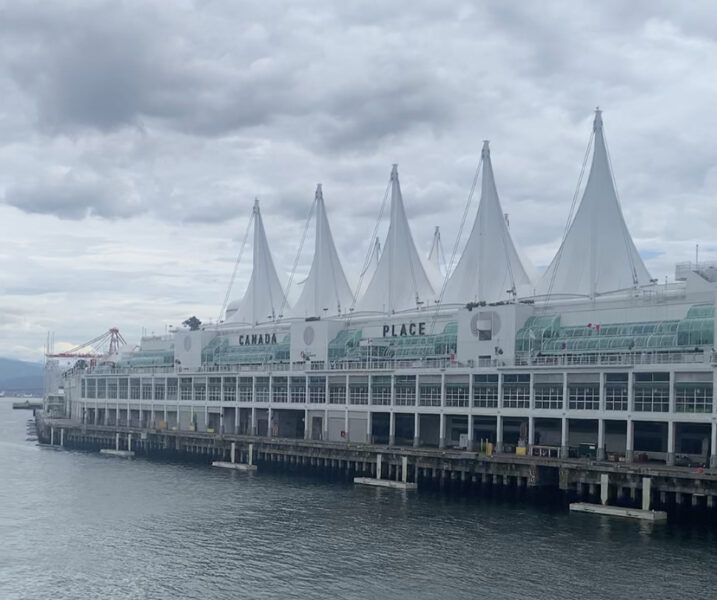
Industry News
News
B.C. port strike resumes after union rejects tentative deal
July 19, 2023 By CFI Staff
 Vancouver harbourfront. Photo: Annex Business Media
Vancouver harbourfront. Photo: Annex Business Media Port workers who are members of the International Longshore Workers Union (ILWU) Canada are back on the picket line late Tuesday after the union’s internal caucus rejected the mediated agreement.
“The ILWU Canada Longshore Caucus does not believe the recommendations had the ability to protect our jobs now or into the future,” the union said in a statement.
The job action of more than 7,000 port workers shut all B.C. ports since Canada Day. On July 12, a senior federal mediator was appointed to make a recommendation of the terms of settlement, which the union and the BC Maritime Employers Association (BCMEA) had 24 hours to ratify or not.
Both parties agreed to a tentative four-year deal on July 13, ending a 13-day shutdown of more than 30 ports in B.C. But on July 17, the union said its caucus has voted down the mediator’s recommended terms of settlement.
“With the record profits that the BCMEA’s member companies have earned over the last few years the employers have not addressed the cost of living issues that our workers have faced over the last couple of years as all workers have,” the ILWU statement said.
Ministers react
Federal Labour Minister Seamus O’Regan tweeted his disappointment, saying he received formal notice from the BCMEA that their membership had accepted the mediated deal in full.
“However, we were also informed that, despite initially agreeing to recommend the terms of settlement, the ILWU Canada’s leadership had decided not to recommend ratification of the terms to their members,” O’Regan tweeted on Tuesday.
We have been patient.
Canadians have been patient.
Every effort has been made.
But this cannot go on.Statement from Minister Alghabra and me: pic.twitter.com/mVdbyLjEKA
— Seamus O'Regan Jr (@SeamusORegan) July 19, 2023
In a joint statement with Minister of Transportation Omar Alghabra, O’Regan said the deal presented to the parties was the result of a constructive and substantive collective bargaining process.
“We should not be here … It represented a fair and balanced deal. It was informed by weeks of collective bargaining and drafted by third-party mediators in the interest of both the union and the employer.
“Workers and employers across Canada cannot face further disruption on the scale we saw last week. Therefore, we are looking at all options. We will have more to say on this tomorrow.
“We have been patient. We have respected the collective bargaining process. But we need our ports operating,” O’Regan and Alghabra’s statement said.
BCMEA’s statement
In a media release, BCMEA claimed that the ILWU leadership rejected the “mediator’s fair and balanced tentative deal without a member vote, once again putting livelihoods and the Canadian economy at risk.”
This is the rest of BCMEA’s statement issued on July 17:
“We regret to advise that ILWU Canada has communicated that ILWU’s internal caucus leadership rejected the tentative agreement, before it was even taken to a vote of the full union membership. We’ve also been informed of ILWU’s intent to engage in strike activity at 16:30 today.
“On July 13, 2023, after 13 days of disruption to Canada’s West Coast ports through ILWU’s strike action, the BCMEA and ILWU reached a tentative deal.
“This was accomplished through a proposed settlement provided by the senior federal mediator, pursuant to the Minister of Labour’s request under subsection 105 (2) of the Canada Labour Code. Both the BCMEA and ILWU recommended ratification of the tentative settlement to their respective memberships. The BCMEA ratified the agreement on July 13.
“This fair and comprehensive package could not satisfy some of ILWU internal caucus leadership, and in rejecting this tentative agreement, ILWU Leadership is choosing to further harm Canada’s economy, international reputation and most importantly, to Canadians, their livelihoods and all those that rely on a stable supply chain.
“The proposed four-year collective agreement settlement package that ILWU internal leadership rejected, included considerable hikes in wages and benefits over and above the ~10% increase received over the past three years, and generally above the established norm of recent private and public sector union settlements in British Columbia and Canada.
“The tentative settlement also included specific provisions that addressed the union’s concern regarding “contracting out” work and measures to improve training, recruitment and retention of ILWU trades workers now and in the future. Specifically, the BCMEA agreed to provide benefit coverage for all casual trades workers, a tool allowance, and a commitment to increase apprentices in the industry by 15 per cent.
“Throughout the past five months, the BCMEA has continued to advance reasonable proposals and positions in good faith with the urgent objective of making progress, reaching a fair deal, and ensuring ports are open and supply chains are stable and reliable. We strongly believe the tentative four-year agreement fairly recognized the skills and efforts of B.C.’s waterfront workforce, while allowing for the safe restoration of critical cargo operations for all Canadians.
“Clearly this fair and equitable package wasn’t enough for the ILWU internal leadership, and they chose to instead remain entrenched in their position with little regard to the lives and jobs they are impacting.”
Print this page